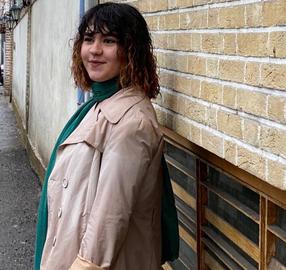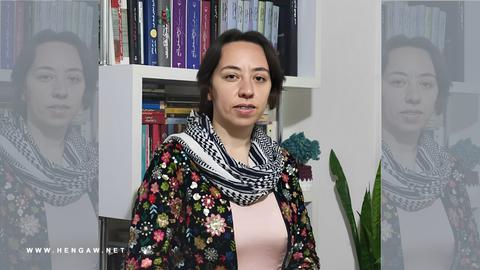These years, hardly a day goes by without the name of Masih Alinejad, a journalist and women’s rights activist, appearing on social media or on domestic and foreign media.
Masoumeh (Masih) Alinejad was born on September 11, 1976, in the village of Ghomi Kola in the northern province of Mazandaran. Her family was extremely religious and its female members wore the hijab, even in the confines of the home. For Masih as a child, hijab was not just a piece of cloth on her head; it was a symbol of all of Iran’s social and religious restrictions and represented the extreme pressure exerted on girls and women in the country.
She became politically active at an early age. In 1996, agents of the Intelligence Ministry arrested the pregnant Alinejad, her brother and her then husband for distributing leaflets and posting graffiti that criticized the Islamic Republic. The Revolutionary Court tried them without giving them access to a lawyer. Alinejad was soon released but her brother and husband spent two and a half years in prison.
“The media wrote nothing about us,” she told IranWire. “I was thinking that a lot of people pay the price in villages and provincial towns and the media never talks about them. So, I decided to leave the provinces and go to Tehran. I did not want to belong to a small student group that the government could suppress without paying a price. And it did suppress us. But if I worked for newspapers I could criticize more loudly. When I joined reformist newspapers I could criticize those in power from close up. I went to Tehran and decided that I wanted to become a journalist.”
In 2001, Alinejad began her journalism career with Hamshahri newspaper. She contributed to many other reformist newspapers, including Shargh and Bahar, most of which were later banned. Later, she became the parliamentary reporter for the Iranian Labor News Agency (ILNA).
Before leaving Iran, she also reported and wrote for papers close to reformists such as Shargh, Bahar, Ham Mihan and Etemad-e Melli.
Her style was aggressive, which did not endear her to many Islamic Republic politicians. In 2005, she disclosed in an article that members of parliament were being paid huge sums in New Year bonuses and supported her claim by reproducing three of their pay stubs. This created an uproar, and many MPs criticized her for using abusive language. After this, she was banned from entering parliament.
But Alinejad continued her investigative journalism. In the aftermath of the disputed 2009 presidential election, while the government was denying that there had been any violence committed against demonstrators, she was able to document and publish the names of 57 people who were killed during the protests.
After the election, the government launched an extensive crackdown on freedom of speech and arrested many journalists, bloggers and people who were active on social networks. Feeling imminent danger, Alinejad decided to leave Iran for the UK.
Before leaving the country she wrote two books including A Crown of Thorns, which was about her own life and her expulsion from parliament as a reporter.
Alinejad has since published three other books: I am Free, which deals with women's issues in Iran, was published in Germany because it was blacklisted by the Ministry of Culture and Guidance; A Green Date, a novel about the aftermath of the 2009 presidential election; and The Wind in My Hair: My Fight for Freedom in Modern Iran, about her journey from her native village to becoming a journalist and starting an online anti-forced hijab movement in Iran.
Leaving Iran started a new chapter in Masih Alinejad’s journalistic activities. In her early years outside Iran, she had yet to completely remove her hijab. She was a critic of both left and right opponents of the Islamic Republic who aimed at overthrowing the regime and promoted boycotting elections. This, however, did not prevent the Islamic Republic and its affiliated media outlet from smearing and attacking her. Gradually, Alinejad turned into one of the harshest and most active opponents of the Islamic Republic.
“My Stealthy Freedom”
In May 2014, after she had removed her hijab once and for all, Alinejad launched her Facebook page My Stealthy Freedom, publishing photographs of herself not wearing the headscarf and appealing to Iranian women to send her similar photographs of themselves and a short note about their experience. The response was enthusiastic and immediate.
“The first time I posted photos of myself with and without my head covered, we received a whole lot of similar pictures, i.e., pictures of women with and without their heads covered,” she told IranWire. “Many of them had something to say as well. ‘The picture on the left is my passport photo,’ wrote one. ‘The problem for Iranian women is that when we want to travel our passport photos are very different from us.’ This has happened to me as well.” She described how passport officials looked at her passport and looked at her and said, “Which one are you? The one in the passport or the one who is standing before me?” She said she had to explain “that for the past 30 years I have been the same two! The one that you see in the passport is the one that the government wants and the one that you see standing before you is the real me.”
But the outpouring was not limited to women. “One of the things that I really loved was that not all men made fun of us,” she says. “Many men joined their wives, their sisters or their mothers, took a picture and sent it to the page to declare their solidarity. The comments were approving, too. A man sent a picture in which he is holding a scarf flying over his head. He saw his own freedom in the freedom of his partner.”
The popularity of the Facebook page in Iran grew fast and it now has a million followers. Needless to say, this popularity irritated religious conservatives and hardliners in Iran to no end. Besides the usual insults against Alinejad — some called her a prostitute — Iranian state-run TV broadcast a false report claiming she had been raped in London in front of her son. The undertone of most reports about rapes in official Islamic Republic media is that the raped woman is at least partially responsible. The report about Alinejad was designed to provide evidence that Alinejad is “morally corrupt” and that rape is what women who do not wear hijab should expect.
In response to this report, Alinejad posted a video of herself singing in a London underground metro station. She also filed a complaint through a lawyer in Iran against the producer of the TV program in Iran. Unsurprisingly, the Iranian judiciary has taken no action.
Her page, of course, also had its critics among women rights activists and feminists. The critics said that the fight of Iranian women against mandatory hijab is as old as the regime itself and is no longer “stealthy.”
When, in October 2014, a string of acid attacks took place in Isfahan, official reports listed only four women as victims, although unofficial numbers were higher. Women from Isfahan started to send pictures and even videos to My Stealthy Freedom and a more comprehensive picture began to emerge from the attacks, a picture showing the official apathy and the defiant reaction of many women in the city.
In 2014, Alinejad moved from the UK to the United States. The same year, she married Kambiz Foroohar, a senior journalist with the New York-based media company Bloomberg.
In February 2015, the Geneva Summit for Human Rights and Democracy, a group of 20 non-governmental organizations, presented Alinejad with a women’s rights award for “giving a voice to the voiceless and stirring the conscience of humanity to support the struggle of Iranian women for basic human rights, freedom and equality.”
“I'm delighted to receive this award,” said Alinejad in a statement soon after. ““From seven-year-old schoolgirls to 70-year-old grandmothers, women in Iran are all forced to wear the hijab. Hopefully this award will create an opportunity for the voices of Iranian women who say no to forced hejab to echo throughout the halls of the United Nations.”
During these years, Masih Alinejad also launched several campaigns that required action not only on social media but also in the streets. Notable among them was the White Wednesdays campaign, perhaps a preview of the 2022 nationwide protests. It encouraged Iranian women to campaign for women’s freedoms by removing their hijab, holding up white headscarves or pieces of white clothing and capturing the gesture in a photograph or video and then sending them to the campaign for wider circulation.
Targeted by Kidnapping and Assassination Plots
Meanwhile, the Islamic Republic intensified its campaign and threats against Masih Alinejad. Her family was forced to sit for an interview, broadcast on state TV, in which it had to denounce her actions and her stance against forced hijab. Her brother Alireza Alinejad was arrested and sentenced to eight years in prison.
In the summer of 2021, four Iranians were indicted in New York City over a plot to kidnap Alinejad. And in January 2023, US prosecutors charged three alleged members of a criminal organization with ties to Iran's government with conspiring to murder her.
Rafat Amirov, Polad Omarov and Khalid Mehdiyev were charged with murder-for-hire and money laundering for their role in the thwarted Tehran-backed plot, the Department of Justice said in a statement.
Besides continuing her work on the My Stealthy Freedom page, she hosts a satirical show on Voice of America’s Persian Service and is a correspondent for Radio Farda. But her political activities have now gone beyond journalism and, as an internationally recognized activist for women’s rights in Iran, she has had meetings with Western politicians, often criticizing them for appeasing the Islamic Republic.
One such meeting, which proved very controversial, was with Secretary of State Mike Pompeo in February 2019.
In response to criticisms, Alinejad said that during her meeting with Pompeo she told him that Iranians do not want war, and they cannot support the Islamic Republic as it stands. She said she had asked him to lift sanctions, which hurt ordinary people, and urged him to instead impose sanctions on the state-run radio and TV network, the Revolutionary Guards and torturers.
As to why she accepted Pompeo’s invitation to meet him, Alinejad told IranWire: “Many of the same people who object that Pompeo is a warmonger and that I should not have met him voted for characters like [Ghorbanali] Dorri Najafabadi [Intelligence Minister during the murder of intellectuals and critics of the Islamic Republic, known as the “chain murders”], warmongers of the Revolutionary Guards and torturers. So, they recognize [the legitimacy of] domestic warmongers.”
“Secondly, I went to meet him to say that we do not want war. If we do not want war then we must talk. I told Pompeo that instead of placing sanctions on the people of Iran, they should sanction warmongers and the oppressors of the Islamic Republic, instead of restricting visas for ordinary people, restrict the princelings of hostage takers and torturers who rob the Iranian people and take money outside the country. When my rhetoric is the same as the peaceful rhetoric of Iranian people, I must ask why they only hear those who support war and tensions.”
visit the accountability section
In this section of Iran Wire, you can contact the officials and launch your campaign for various problems

























comments